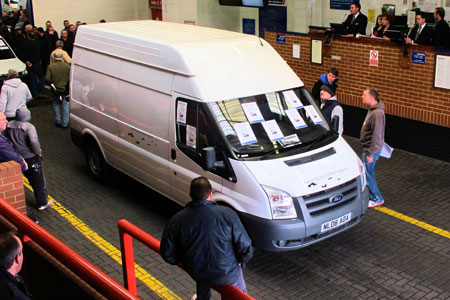“Some traders will happily stock something a little different but it may take months and a lot of hard work to secure a retail margin.
"As with all vehicles, it pays to understand the costs of replacement components, such as battery cells, should the originals fail.”
All is not doom and gloom on the eco-fuel front at disposal time, according to Alex Wright, managing director of Shoreham Vehicle Auctions.
He said some makes were more accepted than others and as they prove themselves in the new market and names of makes and models become more widely known, that will be reflected at auction.
Wright said: “The Toyota Prius hybrid car has been around for more than 10 years, yet the acceptance of the vehicle at auction and among traders has been gradual.
"We sold a batch of six- to seven-year-old Toyota Prius cars recently which made good money (for example a standard seven-year-old typically made £5,500 and a standard four-year-old version £8,000) because their hybrid technology has proved itself.”
When it comes to electric vehicles, Wright is not so sure. He said: “Buyers of electric vehicles need to be able to access short-term leasing of batteries because the capital costs are far too high for companies to invest in them.
"In addition, we need a standardisation of the batteries and connection points within the industry in the same way we have standards for the simple electric plugs. This will strengthen trust and understanding in the products.
“For example, we recently sold a batch of 10 Modec truck EVs, which cost £65,000 new, for £1,500 each from a public utility.
However, once we take into account that they were sold as non-runners – without batteries which cost £30,000 to replace and have a shelf-life of five years – and had also sustained damage to the drive train, you can understand why the bidding was so low.
“Used buyers are only interested in whether the vehicle has a second life and what it will cost to keep on the road.
The uncertainty meant prices were lower than you would have expected for this type of vehicle.”
Jon Mitchell, UK sales director at online auction firm Autorola, takes a more positive approach to the sales of electric vans.
He said: “Whenever there is something out of the ordinary, the market is inevitably wary. As long as we don’t see large volumes coming to auction, we think the market will easily absorb alternatively-fuelled vehicles.
“With a good two years to go before we see them in any great number, confidence could well have grown in electric vehicles, but if we have significant numbers at once, the market could be halted in an instant.
"Even as many as 10 in one batch could have a detrimental effect – it needs to be slowly and softly.
“Having said all that, diesels were a ‘no go’ for traders for years and now they don’t want anything but diesels so alternative-fuelled vehicles have the potential to repeat history.”















Login to comment
Comments
No comments have been made yet.